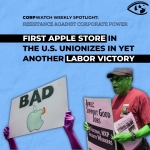US: Wal-Mart's Musical Moves
The giant retailer's success in its exclusive relationship with singer Garth Brooks has some in the recording industry worried about the company's plans.
Deb Whittington, a 41-year-old high school science teacher from Effingham, S.C., and a devoted Garth Brooks fan, had to go to Wal-Mart Stores Inc.'s website to preorder the country singer's new CD and DVD boxed set.
And when she wanted another "Garth Brooks: The Limited Series" - just in case anything ever happened to her first set, Whittington said - she had to go to her local Wal-Mart store to get it. That's because the retailer has exclusive rights to the discs and all of Brooks' past and future music as well.
"I have to go to Wal-Mart anyway for other stuff, so I probably would have picked it up from Wal-Mart anyhow," she said of the $25 set. "Not to mention it was a great price."
Just as it has done with toys, clothes and toiletries, the world's biggest retailer went right to the source - in this case, Brooks himself.
"The middleman's cost that was eliminated was also eliminated for the people," Brooks said. "To get a box out like that for $25 just shows me that these guys are not just eliminating the middleman and keeping the middleman's money - that makes me feel very good."
This latest example of Wal-Mart's "direct procurement" approach continues the company's practice of upending the traditional relationship between the makers of goods and those who sell them.
The deal has some in the recording industry alarmed at the thought of Wal-Mart's establishing direct partnerships with musicians and cutting out the labels. And it may just be the start.
The company Wednesday announced the launch of Wal-Mart Soundcheck, a series of exclusive musician performances and interviews that will be broadcast in stores and over the Internet. The program's offerings initially will include studio sessions with rock bands Yellowcard and Switchfoot and will expand to include performances from country, R&B and hip-hop stars, the retailer said.
"It's analogous to the way they want to deal with their vendors - they want to deal directly and cut out the middleman, whether it's widgets or Rubbermaid, and now they're doing it with stars," said Nelson Lichtenstein, a professor of history at UC Santa Barbara and editor of "Wal-Mart: The Face of 21st Century Capitalism." "Whatever they touch they transform, because they're so big and they have such tremendous market clout and power."
Wal-Mart's arrangement with Brooks marks the first time that a superstar has made an entire catalog available through only one outlet. Although one-time exclusive albums have become common - Bob Dylan and Alanis Morissette released albums through Starbucks Corp., for example - few artists have been willing to partner with a single chain.
The Brooks deal reflects the retailer's power within the recording industry, particularly in country music. Some label executives estimate that Wal-Mart is responsible for 50% of the genre's sales.
"Could Wal-Mart become a label? Absolutely," said Neal Spielberg, a former Nashville sales chief for Warner Bros. Records.
"There's a huge concern that someone like [country star] Faith Hill will do a deal directly with Wal-Mart," he said.
The relationship with Brooks began when David Porter, Wal-Mart's vice president for movie and music merchandise, saw other retailers making exclusive album deals with rock and pop stars. Porter immediately thought about Brooks.
"We decided that for this holiday season we should be involved in some type of offering," Porter said. "We know our customers match up with his fans."
Porter flew to Oklahoma in late 2004 for lunch with Brooks at the Delta Cafe in Tulsa, not far from Brooks' ranch in Owasso.
"To hear Wal-Mart wants to come to you for lunch - I'd always gone to them," Brooks said. "I walked out of there feeling pretty important for a guy who has been retired."
Wal-Mart announced the deal in August under which it would have exclusive rights to sell a limited number of the boxed sets, representing the second half of Brooks' career.
Because he owns his master recordings, Brooks also was able to appoint Wal-Mart as the sole retailer offering his past and future recordings. Once other retailers sell out their inventories, Wal-Mart will be the only place to get his music for an unspecified period.
The announcement came two months after Brooks ended his 16-year relationship with Capitol Records, where he shipped more than 105 million albums, according to the Recording Industry Assn. of America.
So far, the partnership has been a success. "The Limited Series," released on Thanksgiving weekend, sold 1 million copies after 15 days on store shelves, Wal-Mart said.
The record industry association, which certifies albums as "platinum" when 1 million copies are shipped, said it was auditing sales data submitted by Brooks' personal label, Pearl Records.
The initial sales - near-record numbers for a multi-disc set - concern some music industry executives, many of whom would not speak on the record for fear of alienating Wal-Mart, their biggest customer.
Porter said he had taken plenty of calls from entertainment executives wanting to know Wal-Mart's plans. At the moment, he said, there aren't any beyond the Brooks deal.
Neither party would disclose terms of the deal.
"I wake up and put my head on a pillow every night looking for opportunity in the music and movie worlds," Porter said. "We are interested in growing sales; these are important areas to our stores, and we are a growth company."
Not everyone in Nashville views Wal-Mart as a threat.
"I don't get the sense that Wal-Mart is trying to enter the label business," said Joe Galante, chairman of RCA Label Group/Nashville. Galante said he was told that Brooks' Thanksgiving release was designed primarily to drive customers into Wal-Mart stores during the holidays.
"Labels do a lot of things besides manufacture and sell records," Galante said. "We market musicians, we get radio stations to play songs, we help produce tracks and guide musical careers. Wal-Mart doesn't have an expertise in those things."
Still, those skills can be replicated. Brooks struck a deal last year with Lyric Street Records, a part of Walt Disney Co.'s music division, to promote his new songs to radio programmers - an important service that labels usually provide. So far the partnership has worked: Brooks' latest single, "Good Ride Cowboy," was aired more than 32,000 times by U.S. radio stations in December alone, according to radio airplay monitoring service Mediaguide Inc.
Further, Galante conceded, as RCA Nashville's largest customer, Wal-Mart has a keen understanding of the country music consumer.
"Wal-Mart understands our customers better than any other retailer, and they have the best single distribution into the communities that buy our music," he said.
The retail giant also has another advantage: a vast marketing budget.
"If a retailer is going to spend $10 million on an effective ad campaign, there's a huge upside for the artist," said Gary Borman, who manages Hill and other artists.
A deal like the one he struck wouldn't be right for every musician, Brooks said, but that doesn't mean the arrangement would work only for him.
"I've talked until I'm blue in the face trying to suggest things to do like this," Brooks said. "Anybody else could do this."
That's why executives are keeping a wary eye on Wal-Mart.
"We're in a period of huge transition," Borman said. "Wal-Mart has the might if they put their minds to it. And because the labels need them so much, they have a lot of power to demand whatever they want."
- 180 Media & Entertainment


